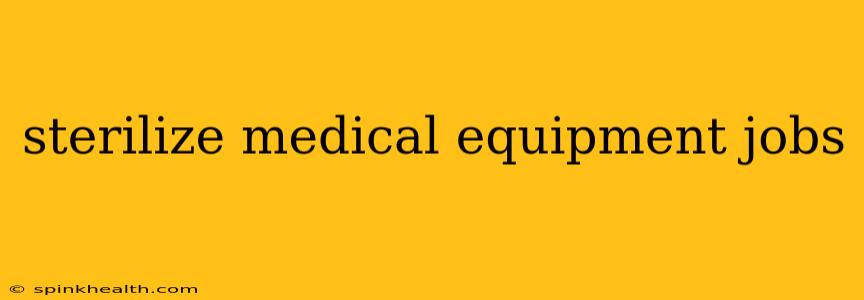Sterilizing Medical Equipment: A Career Deep Dive
The whirring of autoclaves, the precise arrangement of instruments, the quiet satisfaction of knowing you've contributed to a safer healthcare environment – this is the world of medical equipment sterilization. It's a crucial, often unseen role, demanding meticulous attention to detail and a commitment to patient safety. But what exactly does a career in sterilizing medical equipment entail? Let's explore the diverse opportunities and challenges this field offers.
My name is Sarah, and I've spent the last 15 years working in various roles within the medical sterilization field, from entry-level technician to supervisor. My experience has shown me the diverse paths available and the crucial importance of this profession. I'll share my insights to help you understand what a career in this field might look like.
What are the different jobs in medical equipment sterilization?
The field isn't just about loading and unloading autoclaves. It encompasses a variety of roles, each requiring specific skills and responsibilities. Some common job titles include:
-
Sterile Processing Technician (SPT): This is often the entry-level position. SPTs are responsible for the entire sterilization process, from decontamination and cleaning to packaging, sterilization, and storage of medical instruments and equipment. They are the backbone of the sterilization department.
-
Central Sterile Service (CSS) Technician: Similar to an SPT, but often within a larger hospital system where they may specialize in specific areas or equipment. They may also be involved in inventory management and quality control.
-
Sterile Processing Supervisor/Manager: Supervisory roles involve overseeing the entire sterilization process, managing staff, ensuring compliance with regulations, and implementing quality control measures. This requires strong leadership and organizational skills.
-
Quality Control Specialist: These specialists focus solely on ensuring the effectiveness of the sterilization process. They perform testing, monitor equipment, and analyze data to identify and address any potential issues.
-
Infection Control Practitioner: While not directly involved in sterilization, infection control practitioners work closely with the sterilization department to prevent healthcare-associated infections. Their expertise is vital in maintaining a safe environment.
What skills are needed for a job in medical equipment sterilization?
Regardless of the specific role, certain skills are essential for success in medical equipment sterilization:
- Attention to detail: Accuracy is paramount. A single mistake can have serious consequences.
- Manual dexterity: Handling delicate instruments requires fine motor skills.
- Technical aptitude: Understanding sterilization equipment and procedures is crucial.
- Organizational skills: Managing inventory, tracking equipment, and maintaining records are important aspects.
- Teamwork: Sterilization often involves working collaboratively with other healthcare professionals.
- Knowledge of infection control principles: Understanding how to prevent the spread of infections is essential.
What is the education and training required for these jobs?
The educational requirements vary depending on the role and location. Many entry-level positions, such as SPT, require a high school diploma or equivalent, followed by on-the-job training and certification programs offered by organizations like IAHCSMM (International Association of Healthcare Central Service Materiel Management). More advanced roles, such as supervisors or quality control specialists, often require additional education and experience.
What is the job outlook for medical equipment sterilization careers?
The job outlook is generally positive, with a growing demand for skilled professionals in this field. The increasing complexity of medical technology and the ongoing emphasis on infection prevention create a sustained need for qualified sterilization technicians and managers.
What is the salary range for these jobs?
Salary varies based on experience, location, and employer. Entry-level positions typically start at a lower pay rate, while more experienced professionals or those in supervisory roles command higher salaries.
This overview only scratches the surface of the rewarding and vital field of medical equipment sterilization. If you're detail-oriented, dedicated to safety, and want a career that directly impacts patient well-being, explore the various opportunities available within this essential healthcare profession. Remember to research specific educational requirements and certification programs in your area to find the perfect path for you.

